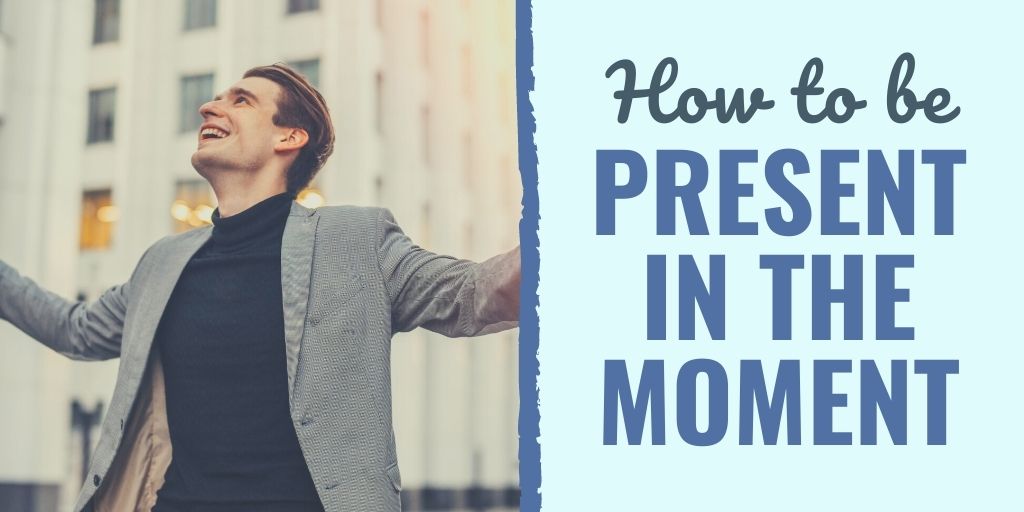Have you ever found yourself worrying about different things? Have you ever felt that a sense of worry and stress often clouds big events and celebrations of your life? These feelings are so common among people.
Humans are the wisest species of them all, and they get this label because of their ability to contemplate the future. Our foresight and ability to intelligently calculate the risks attached to certain activities are why we are unique.
But our wisdom – and that inherent quality of worrying about the future – is the very reason why we feel depressed and anxious all the time. Many people are so consumed worrying about what they cannot control that they forget to breathe and live in the moment. The result: all the beautiful moments pass by, and we fail to even notice them.
Instead of constantly thinking about what the future holds for you, you should focus your entire energy on the present.
A study shows that people spend nearly half their time thinking about something else and not focusing on what they are doing in the present. Suppose you are at a party at your friend's house on a Saturday night.
While you should normally be enjoying yourself, you are worried about what will happen on Monday morning at work. Since you are preoccupied with worries and stress, you didn't enjoy your time at all.
Will we ever be able to fight against the feeling of helplessness and anxiousness? Or will we forever be trapped inside the web of our own negative thoughts? The good news is that we can break free from these thoughts that dominate our minds 24/7, and the key is to stay in the present and not be distracted.
But the only way to emerge stronger and feel good even during times of adversity is for you to take charge of your life. A study has found that happiness is a choice. You ought to make an effort to feel good about yourself and be happy.
The level of happiness that you can attain is directly proportional to the extent to which you stay in the present. This post will look at different ways to help us be present and live in the moment daily.
Sidebar: One way to live in the present moment is to build a mindfulness habit. If you're interested in learning more about this concept, check out the book Declutter Your Mind to learn how to stop worrying and reduce anxiety.
Let’s learn how to be present in the moment…
Simple Ways to Be in the Present Moment
1. Trust Yourself
In a 2005 Stanford speech, Apple founder Steve Jobs said: “You can't connect the dots looking forward; you can only connect them looking backward. So you have to trust that the dots will somehow connect in your future.” The message of the founder of the tech giant can be interpreted as follows: you have to trust that whatever life is throwing at you will play an important part in determining your future.
It doesn't matter what happened to you in the past or what other challenges you will face in the future. What matters is how you act in the present and what you are doing about the things that matter today.
You have to trust that whatever challenges and difficulties that you stumbled upon in your journey toward your goal will somehow lead you to your final destination. You have to trust in your abilities and your skill.
You have to trust that you have what it takes to do something great. This will give you the required courage to push yourself and work towards your goals.
Having self-awareness is vital in learning to trust yourself. Finding out whether you're a realist or visionary can help you learn more about yourself.
2. You Are Not Your Thoughts
Each of us is carrying the weight of our inner voice that reminds us about the good and the bad things about ourselves. However, if the inner voice keeps meddling in your activities to such an extent that they restrict you from working on your true potential, you have to make an effort to prevent them from dominating your mind.
Imagine that you have to deliver a speech in front of an audience. You are well-prepared, and you know that you can nail it, but the inner voice keeps reminding you of all the things that can go wrong. “What if you mispronounce a word?” “What if you forget all the important points midway?” The inner voice tricks you into believing that you are not good enough.
You can defeat this voice by not focusing on it. You have to try to replace those negative thoughts with positive ones. And when you are up on the stage, you have to let go of all fears and be present. Thinking too hard about your actions sometimes leads to unfavorable results. In your attempt to make your work flawless, you make even more mistakes.
Delivering a speech or leading the presentation may make you anxious. But if you focus on your anxiety and let it control your thoughts, you will make things worse for yourself. You have to live in the moment and focus on what you have to deliver instead of what can go wrong or how your audience will react to what you have to say.
3. Practice Mindfulness
Mindfulness is the state of active and intentional attention to the present. It urges you to go with the flow, be present, and just focus on being. Mindful people are happier and have a positive outlook on life. Is mindful an inherent quality, or can you achieve mindfulness at any stage of your life?
You can work on being more mindful at any age. We have listed down a few exercises that will help you focus on yourself and live in the moment instead of focusing on distracting and negative thoughts.
Wake Up Early
When you wake up early in the morning, you have a great opportunity to get the important things done. You also will have low levels of stress and anxiety as you don’t have to rush to catch the bus to work or get other tasks done.
Mindful Eating
Mindful eating is another way to achieve in the moment awareness and is good to incorporate into your mindfulness training. It allows you to be more mindful of the food and drink you are putting into your body. Pay close attention and observe the food as you eat it, and take note of how it makes you feel. Your body will send signals to your mind about the taste, satisfaction, and fullness you experience during mindful eating.
Be Grateful
We have defined our life's purpose with lists and goals. Minutes after reaching one goal, we motivate ourselves to achieve another goal. Since we are living in a highly greedy and materialistic world, we often take some of our blessings for granted.
For instance, we don't feel cultivating gratitude because we don't have any chronic disease to deal with or we have no medical condition that puts a restriction on our diet. Instead of focusing on what we have, we normally spend time daydreaming about the items that we want to possess.
For example, if your company poses a groundbreaking profit of several thousand, you instantly define another difficult goal for yourself. You don't even get the chance to breathe and feel about achieving the first goal.
As a result, you spend the rest of the quarter worrying over whether you can meet the goal. It is important to pause for a short while, show gratitude for your achievements, and focus on your positive emotions.
Cultivating gratitude helps you appreciate even the small pleasures of your life and prevents negative emotion and thoughts from clouding your thoughts. (If you’d like to learn more about this concept, be sure to check out this 90-day gratitude journal.)
Meditation Session
Another important exercise that helps you focus on being in the moment is the concentration exercise. Pick up any object: a ball, a rose, or a book. Hold it in your hands and observe it. And by observe, we don't mean that you should just look at it.
When doing this mindfulness exercise, hold the object and concentrate on it. Look at its design, the loose thread that might be coming out, the delicate lines on the petals, or the hard old cover of the book. Begin this exercise by focusing on the object for 10 minutes and slowly increase the time spent on it.

This exercise helps you observe the small objects you don't pay attention to. It also helps you boost your concentration levels. Once you master it, you will be able to employ the same level of concentration at work or in other important personal matters.
For example, you will listen to what your partner says more attentively or concentrate more on the seemingly less important tasks at work.
Take Digital Breaks
We have grown up using all kinds of gadgets. We constantly check our phones at work to see if we have missed out on an important message or call. It is important to unplug yourself from these gadgets for short periods during the day.
For example, in the morning, don't check your phone for at least the first two hours. Concentrate on your work, and don't distract yourself. What is the use of watching your friend's vacation pictures at work and then spending the rest of the day calculating the amount of money you need to afford the same kind of vacation for yourself?
Practice Breathing Exercises
Take some time out of your day to sit down and practice a breathing exercise. This helps focus the mind on the task at hand. Slow and regulated breaths can also help dissipate feelings of panic and negative thoughts so they don’t take over your mind. Mindful breathing exercises can bring you more present moment awareness.
Smile In the Mirror
Does your reflection in the mirror tell who you really are? Do you find the person who stares back at you to be likable? Are you happy with what you see in the mirror?
Smiling is one of the simple pleasures in life. Doing so releases endorphins – the hormones that reduce stress – and relaxes the body. If you perform a task with a smile on your face, you are likely to have greater productivity levels. This may sound a bit ridiculous at first, but start your day by smiling in the mirror and then enjoy the benefits that come with this easy exercise.
4. Focus on Post-Traumatic Growth
Personal tragedy plays an important role in shaping our personalities. People who have lost a loved one to a serious disease or who have witnessed some sort of a financial disaster are likely to be more skeptical about what the future holds for them.
As a result, they forget to live in the moment and make the most of their time. Every decision that a person makes, then, gets influenced by their past experiences.
It is important to be mindful of what happened in the past. It is also essential to never forget about things in the past. But it is not healthy to hold on to it. You have to let past things go and focus on the present.
For your mental peace and happiness, it is important to live in the present and explore the world with renewed energy.
You should also try to focus on just one thing at a time. When we try to multitask, it makes it much harder to live in the present moment. When doing something, give it all your attention. When you are fully focused on what is happening at the moment, you will remember the details much better later and in the long term.
5. Define Your Daily Goals
That you have certain dreams for your future is a good thing. It also means that you have already found your passion or drive to work hard towards your goal. But, when you define a big goal for yourself, you spend a lot of time thinking about whether you will achieve it or not.
You have to break down your big goals into smaller goals to have a sense of accomplishment every time you manage to finish one goal. Each day, define goals that you intend to achieve and work on completing them. Be present and focus on what you can complete in the now.
6. Notice Your Surroundings
To be present in the moment, you need to notice your surroundings. This means taking time out of your day to look around and actually visualize what is going on. Think about it. When is the last time you just sat down and really looked at everything going on around you?
Close your eyes, take a deep breath, and open up. When you take notice of your surroundings, you will find it is much easier to live life in the present moment.
7. Accept Things as They Are
Instead of trying to control everything going on around you, accept things as they are instead of how you want them to be. Life isn’t going to turn out how we expect all the time, so acceptance is a good way to live in the present moment and allows you to let the things go that are just out of your control.
Understanding Dispositional Mindfulness
Dispositional mindfulness, also known as trait mindfulness, is a personality trait for meditation-based interventions. A person’s innate capacity to pay attention to and maintain attention in a present moment experience, keeping an open mind and non-judgmental attitude.
Mindfulness simply involves paying attention to something in a particular way, while dispositional mindfulness is more of a two-dimensional structure that incorporates focus and attention quality.
Recent research suggests that you can change dispositional mindfulness through your life experiences or mindfulness practice. So, this is good to keep in mind as you practice our mindfulness tips outlined above for present moment awareness.
The Last Word on Living in the Present Moment
You have limited time in the world. Your life will have its ups and downs, and while being happy doesn't require any effort when everything goes in your favor, the real growth will come to you when you hit rock bottom.
These hard times are when you need to focus on being a happier person. That said, if you focus on the five tips we just outlined, you’ll discover that it’s not that hard to live more in the present moment.
Finally, if you’d like to learn more about the concepts we covered in this article, be sure to take a look at the book Declutter Your Mind to learn how to stop worrying and reduce anxiety.


